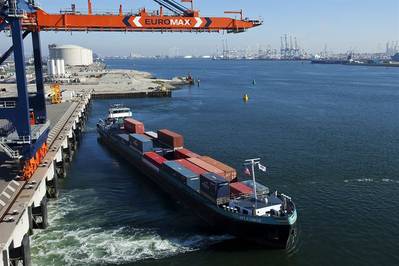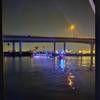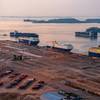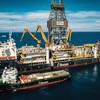Wärtsilä Developing Autonomous Container Shuttle Service
Finnish marine equipment and technology company Wärtsilä said on Thursday it is working to develop an autonomous, emissions-free intra-port, inter-terminal container shuttle that would help address the emerging capacity bottleneck for internal container transportation.
The project is part of an international alliance headed by the Port of Rotterdam Authority, which has this month been awarded nearly €25 million in EU funding to implement projects aimed at sustainable and smart port logistics. This involves the development of a grand plan that sets out how transport within, to and from ports can be made carbon-free by 2050.
While numerous green fuels and energy carriers are being advanced, the partners have also initiated a series of digitalization and automation projects in relation to the energy transition aimed at encouraging businesses to improve the sustainability of their logistics.
The research project, nicknamed MAGPIE (sMArt Green Ports as Integrated Efficient multimodal hubs) was borne out of a collaboration between the port authorities of Rotterdam, DeltaPort (Germany), HAROPA (France: La Havre, Rouen, Paris) and Sines (Portugal), in partnership with 10 research institutions and over 30 companies in the Netherlands, Germany, France, Portugal and Denmark.
Wärtsilä, who said it is the largest industrial partner of MAGPIE, is set to receive the biggest portion of the grant for its autonomous container shuttle subproject. The installation will include several Wärtsilä solutions, including SmartMove Suite, which provides a unique pairing of sensor tech with navigation systems for safe, automated ship movement. Wärtsilä’s autonomous solutions have been tried and tested successfully in the busiest and highly congested waters before, both in inland waterways and at international ports like Singapore, so they can handle high traffic volume safely by design.
“We believe that overland transport modes will not be able to absorb the emerging capacity bottleneck for internal container movement. So, we will be delivering an autonomous e-barge concept that can greatly enhance efficiency in the Port of Rotterdam through automated seaborne cargo transshipment. Our ambition is to see these container shuttles introduced into a smart logistics network within the next few years,” said Hendrik Busshoff, Business Development Engineer, Wärtsilä Voyage.
To lift the ambition level for such a barge to not only being smart, but also emissions-free, electric propulsion will be enabled by means of an electric drive train and a interchangeable battery container solution, which is charged using renewable power.
Teus Van Beek, General Manager, Ecosystem Innovation, Wärtsilä Marine Systems, said, “At Wärtsilä, we maintain that an autonomy strategy is key to a zero-emission ambition. To complement the e-navigation set up, we are part of a consortium that has developed a concept based on the use of replaceable battery containers, known as ZESPacks (Zero Emission Services). A network of open access charging points will be set up for exchanging battery containers for fully charged replacements, thereby keeping waiting time to a minimum. The first of these battery containers will be installed in the summer.”
Wärtsilä has already created the battery containers—something which brewer, Heineken, has already signed up to as a carbon-neutral way of moving 45,000 containers of beer a year up to the Port of Rotterdam.
“The world’s largest economies have high hopes of resolving some of their greenhouse gas challenges and their infrastructure bottlenecks with smart shipping. Since 2015 and combined with an effort to reduce ground transportation, the EU has targeted a 25% increase in cargo transportation by short sea shipping before 2030,” said Sean Fernback, President, Wärtsilä Voyage. “We feel we can enable this. Utilizing new technology, we will change short sea and inland shipping into a safer, cleaner, and more efficient link in the logistic chain, with greater accessibility to those who need it. That’s why we are automating operations.”
Ori Marom, Director of Smart Mobility & 5G, Port of Rotterdam, said, “The future of port logistics belongs to intelligent connected and sustainable systems such as the autonomous e-barge system that we now set to develop together.”














